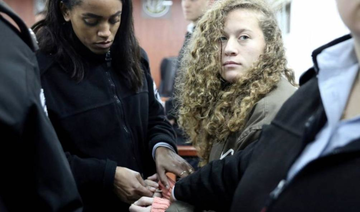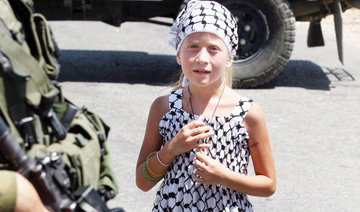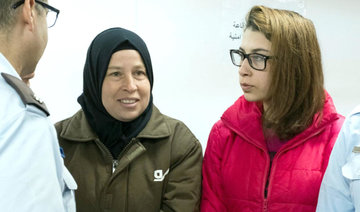NABI SALEH, West Bank: Palestinian protest icon Ahed Tamimi is to go on trial before an Israeli military court on Tuesday for slapping and punching two Israeli soldiers — an act Palestinians say embodies their David vs. Goliath struggle against a brutal military occupation and Israel portrays as a staged provocation meant to embarrass its military.
Israel’s full-throttle prosecution of Tamimi, one of an estimated 300 Palestinian minors in Israeli jails, and a senior Israeli official’s recent stunning revelation that he once had parliament investigate whether the blond, blue-eyed Tamimis are a “real” Palestinian family have helped stoke ongoing interest in the case.
The teen with the curly mane of hair, who turned 17 in jail last month, has become the latest symbol of the long-running battle between Palestinians and Israelis over global public opinion.
The case touches on what constitutes legitimate resistance to Israel’s rule over millions of Palestinians, already in its 51st year after Israel captured the West Bank, Gaza Strip and east Jerusalem in 1967.
Ahed Tamimi’s supporters see a brave girl who struck two armed soldiers outside her West Bank home in frustration after having just learned that Israeli troops seriously wounded a 15-year-old cousin, shooting him in the head from close range with a rubber bullet during nearby stone-throwing clashes.
Israel has treated Tamimi’s actions as a criminal offense, indicting her on charges of assault and incitement that could potentially land her in prison for several years.
Tamimi’s middle-of-the-night arrest from her home in December and her pre-trial court appearances, flanked by Israeli guards and looking impassive, have evoked a sense of history on a loop. Another generation of Palestinians seems locked in a cycle of protests and arrests by Israel, three decades after Palestinians staged their first uprising, throwing stones and burning tires in the streets.
Since the mid-1990s, several US-mediated rounds of Israeli-Palestinian negotiations on setting up a Palestinian state alongside Israel have ended in failure. Gaps in positions only widened in the past decade, as Israeli settlement expansion continued and the Palestinians failed to end a crippling political split between an internationally backed self-rule government in parts of the West Bank and the Islamic militant group Hamas which dominates Gaza.
Tamimi’s father Bassem, who threw his first stone at the age of 14 and was an activist in the first uprising, said he expects the military court will deal harshly with his daughter and that she might remain in prison for some time.
His wife, Nariman, is being prosecuted in the same December 15 scuffle in their village of Nabi Saleh and has been locked up alongside their daughter.
Despite the personal pain, the father said he is optimistic heading into the courtroom and that he believes he is witnessing progress.
He argues that his daughter’s case and the outpouring of support for her — more than 1.7 million people have already signed an online petition calling for her release — signal the beginning of the final chapter of Israel’s occupation.
“I see that we are starting the turning point in our history, to deal with our occupier and colonization in a different way,” said Tamimi. “Yes, there is a price (to pay) ... but this generation Ahed represents will be the generation of freedom.”
Yaakov Amidror, a former national security adviser to Israeli Prime Minister Benjamin Netanyahu, doesn’t believe the trial will hurt Israel’s image, saying that “those who are against Israel will be against it if she (Tamimi) is brought to court or if she is not.”
Amidror played down the findings of a recent Pew poll that indicated younger, liberal Americans are less supportive of Israel’s narrative than older generations. He portrayed young liberals as naive and said he expects their views to change as they get older, but added that Israel needs to work “very, very hard not to lose these people.”
In Nabi Saleh, Bassem Tamimi has used the interest in his daughter’s case to generate more support, saying he has hosted hundreds of foreigners in his home since her Dec. 19 arrest. His living room is decorated with several “Free Ahed” posters and one of Nariman.
On a recent morning, he met with volunteer observers from Switzerland, Sweden, Colombia, Argentina and Britain, going over the details of Ahed’s case and explaining his political views, including his support for a single, bi-national state in which Israelis and Palestinians enjoy equal rights.
The visitors, part of a program that typically has them touring the West Bank for three months, listened intently and jotted down some of what he said. “Your notes will be part of history in the near future,” he told them. “And we will put it in a museum.”
The visit ended with hugs, tears and a group photo on his porch, against the backdrop of Nabi Saleh, a village of about 600 members of the extended Tamimi clan.
After the group left, Bassem Tamimi got word that Hebrew graffiti had popped up on several walls in the village, but that teenagers were trying to cover up the threatening messages.
He rushed to the area, a few hundred meters (yards) from an army watchtower at the edge of the village, to try to preserve what he felt were valuable tools in the PR battle with Israel.
The first slogan called for the death penalty for Ahed. A second read: “The Tamimi family has no place in the Land of Israel.” A third warned: “Greetings from the retaliation branch of the IDF.”
As he took photos and video to be posted on social media, a dozen teenagers, some masked, headed toward the watchtower for weekly stone-throwing clashes with soldiers.
Worried that they might try to spray over the graffiti, Tamimi shouted, “Leave it, leave it,” as the group walked past him.
The boys began throwing stones toward a main road that separates Nabi Saleh from the Israeli settlement of Halamish, built in part on expropriated village land. Several soldiers arrived and fired stun grenades and rubber coated steel pellets.
From her second-floor balcony, Fattoum Tartier, a 41-year-old English teacher, kept an eye on her 11-year-old son, Hussein, in the street below to make sure he didn’t join the clashes.
“I want my children to live a good life, like everyone else in other parts of the world,” she said, her words punctuated by the booms from stun grenades.
Israeli military court to try Palestinian teen protest icon
Israeli military court to try Palestinian teen protest icon

Israel says intercepted missile launched from Yemen

- The Houthis, who control large parts of Yemen, have repeatedly fired missiles and drones at Israel since the war in Gaza
JERUSALEM: The Israeli military said Saturday it had intercepted a missile launched from Yemen, from where the Iran-backed Houthi rebels have launched multiple missile and drone attacks targeting Israel.
“Following the sirens that sounded recently in several areas in Israel, a missile that was launched from Yemen was intercepted” before “crossing into Israeli territory,“a military statement said.
The Houthis, who control large parts of Yemen, have repeatedly fired missiles and drones at Israel since the war in Gaza broke out in October 2023, in what they say is a show of solidarity with the Palestinians.
The rebels have also targeted ships they accuse of having ties to Israel as the freighters travel on the Red Sea — a vital waterway for global trade.
They paused their attacks during a recent two-month ceasefire in Gaza.
According to Israel’s army radio, the missile intercepted overnight was the 22nd fired by the Houthis since they had resumed their attacks as Israel renewed its Gaza offensive on March 18.
Since March 15, Israel’s key ally the United States has stepped up its attacks on the Houthis, targeting rebel positions in Yemen with near-daily air strikes.
Gaza rescuers say 4 dead, 30 missing under rubble after Israeli strike

GAZA: Gaza’s civil defense agency said an Israeli strike on Gaza City on Saturday killed four people and left “more than 30” feared buried under the rubble of a house.
“Our crews were able to recover four martyrs and five wounded following the attack,” said civil defense spokesman Mahmud Bassal, adding that “more than 30” people are presumed missing under the rubble and “our crews cannot reach them because of the lack of the necessary machinery.”
Missile launched from Yemen into Israel intercepted, Israeli army says

CAIRO: The Israeli army said in the early hours of Saturday that a missile that was launched from Yemen was intercepted before crossing into Israeli territory.
Sirens sounded in a number of areas in Israel following the launch, the Israeli army added in a statement.
There was no immediate comment from Yemen’s Iran-aligned Houthis, who have been launching attacks against Israel as well as ships they perceive as affiliated to Israel, in what they say is to support the Palestinians in Gaza against the Israeli offensive on the enclave.
Former Lebanese PM Diab questioned over Beirut port blast

- Investigation gains momentum as French official files transferred to Judge Tarek Bitar
- Lebanese President Aoun reiterates importance of judiciary in securing broader reform
BEIRUT: Former Lebanese Prime Minister Hassan Diab appeared before Judge Tarek Bitar on Friday for questioning related to the devastating Beirut port explosion of Aug. 4, 2020.
Diab was interrogated for two and a half hours before being remanded for further questions. The session came a week after Bitar questioned former Interior Minister Nohad Machnouk.
In recent weeks, former General Security Chief Maj. Gen. Abbas Ibrahim and former Head of State Security Maj. Gen. Tony Saliba also appeared before the judge.
The explosion devastated the capital’s waterfront, resulted in thousands of casualties, and has been compared in scale to a nuclear bomb.
It prompted widespread outrage both at home and abroad due to the long-term neglect in safely storing large quantities of ammonium nitrate at the port.
Diab, who was prime minister at the time of the explosion, had previously failed to attend hearings into the disaster for various reasons, notably claiming that “the investigative judge lacked jurisdiction to question” him, or stating that he was abroad.
For more than 18 months, several individuals contested their summons, arguing that Bitar was not the appropriate authority to investigate them.
They also initiated lawsuits against Bitar, whose work was suspended for a significant period due to political pressures and legal challenges.
During their unexpected appearances before the investigative judge, these individuals all expressed their intention to cooperate.
In Lebanon, political and judicial powers are intertwined, contrary to the constitution’s separation of powers principle.
The judiciary is mostly subject to political pressure, starting with judicial appointments, as with other institutions and administrations, which hinders reform efforts and the full independence of the judiciary.
A ministerial source told Arab News that President Joseph Aoun had always stressed two key pillars essential for the state’s recovery are security and the judiciary.
“The security appointments have been finalized, and measures are in place to restore security.
“The minister of justice and the High Judicial Council are actively working on judicial appointments to restore processes free from political interference and corruption.
“These procedures have started to affect the justice system, and everyone has begun to understand that the authority of the judiciary is not negotiable; the previously accepted method is no longer valid.”
The source emphasized that gaining political support for the judiciary is essential to shield it from interference.
This should be prioritized, particularly in light of the president’s commitment to maintaining judicial independence.
Additionally, Prime Minister Nawaf Salam is dedicated to implementing the ministerial statement that received unanimous support through the vote of confidence in his government, said the source.
Political authorities are still debating the law on judicial independence, but it remains unapproved and is currently stalled in joint parliamentary committees.
Aoun has previously stressed his belief in the judiciary as a cornerstone of reform.
In a recent meeting with the Bar Association, he noted that the challenge is not the coubtry’s laws themselves, but their implementation and accountability for violations.
“Too often, laws are interpreted for personal gain and interests. By working together, individuals committed to justice and accountability can address imbalances, fight corruption, and promote responsibility,” he said.
“Only the judiciary has the authority to deter offenders and corruption,” the president added.
Currently, the High Judicial Council is investigating bribery cases involving several judges and has issued a preliminary arrest warrant for one of them, who was arrested and transferred to the prison run by the General Directorate of Internal Security Forces.
The council recently set up three bodies to investigate cases against judges.
Lawyer Ghida Frangieh — who represents victims of the Beirut port explosion — told Arab News that the “renewed cooperation between the Public Prosecution and investigative Judge Bitar is a crucial development.
“It will help revive the port explosion case and allow the investigation to continue until an indictment is issued and, ultimately, a trial takes place,” Frangieh said.
“The election of the republic’s president, setting up a functional government instead of a caretaker government, and the political will for reform would collectively help reactivate Lebanon’s judicial system.
“This should have been the scenario in the port investigations three years ago, and all pending judicial cases should now be addressed and resolved in due order,” Frangieh added.
A French delegation is set to arrive in Beirut next Monday, following the transfer of judicial summons from the Public Prosecution at the Court of Cassation in Lebanon to France.
Bitar has requested access to French investigations regarding the port explosion, and the French judiciary has expressed willingness to support the judge by providing all necessary files and documents for his investigation.
Several French nationals were among those killed and injured in the Beirut port explosion.
US says blast near UNESCO world heritage site caused by Houthi missile

- A Houthi official was quoted by the New York Times as saying the American denial was an attempt to smear the Houthis
WASHINGTON: The US military said a blast on Sunday near a UNESCO world heritage site in Yemen’s capital city of Sanaa was caused by a Houthi missile and not an American airstrike.
The Houthi-run Health Ministry said a dozen people were killed in the US strike in a neighborhood of Sanaa. The Old City of Sanaa is a recognized UNESCO World Heritage Site.
The US ordered the intensification of strikes on Yemen last month, with officials saying they will continue assaulting Houthis until they stop attacking Red Sea shipping.
A US Central Command spokesperson said the damage and casualties described by Houthi officials “likely did occur,” but a US attack did not cause them.
The spokesperson said the closest US strike was more than 5 km away that night.
The US military assessed that the damage was caused by a “Houthi air defense missile” based on a review of “local reporting, including videos documenting Arabic writing on the missile’s fragments at the market,” the spokesperson said, adding the Houthis subsequently arrested Yemenis.
A Houthi official was quoted by the New York Times as saying the American denial was an attempt to smear the Houthis.
Recent US strikes have killed dozens, including 74 at an oil terminal on Thursday in what was the deadliest strike in Yemen under Trump so far, according to the local Health Ministry.
The US military says the strikes aim to cut off the Houthi militant group’s military and economic capabilities.
Rights advocates have raised concerns about civilian killings, and three Democratic senators, including Sen. Chris Van Hollen, wrote to Pentagon chief Pete Hegseth on Thursday, demanding an accounting for the loss of civilian lives.
The Houthis have taken control of swaths of Yemen over the past decade.
Since November 2023, they have launched drone and missile attacks on vessels in the Red Sea, saying they were targeting ships linked to Israel.





















